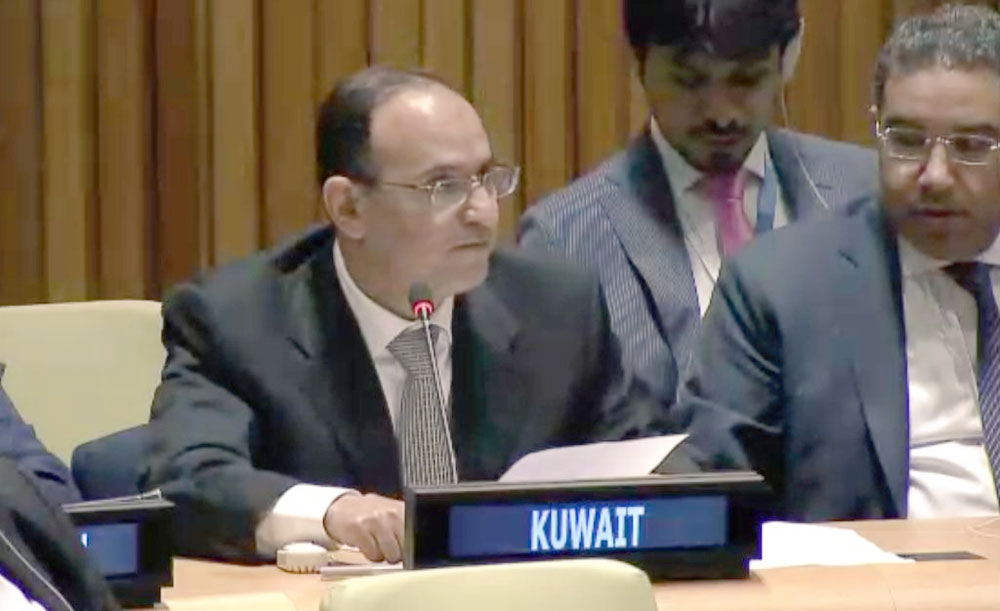LOC09:14
06:14 GMT
 The State of Kuwait Permanent Delegate to the UN, Ambassador Mansour Al-Otaibi
The State of Kuwait Permanent Delegate to the UN, Ambassador Mansour Al-Otaibi
NEW YORK, Oct 21 (KUNA) -- The State of Kuwait, addressing an informal session of the UN General Assembly, has re-asserted its belief that there is no military solution to the six-year Syrian crisis.
Resolving this crisis must be according to the UNSC Resolution 2254 which outlined a clean path for reaching a political settlement to the crisis in Syria, on the basis of the first Geneva conference held in 2012 as well as the two relevant declarations that had been made in Vienna, said the State of Kuwait Permanent Delegate to the UN, Ambassador Mansour Al-Otaibi.
Al-Otaibi was addressing an information session of the General Assembly on the humanitarian conditions in Syria.
Echoing stand of the Kuwaiti Government, the senior diplomat called for maintaining the truce in Syria to pave way for holding discussions among the stakeholders.
One of the reasons that had prompted Kuwait, along with 69 other member states, was the need for the member states to shoulder their responsibilities in line with the UN charter, following failure to protect the Syrian civilians as the crisis ushered its sixth year, said the ambassador highlighting the need for effective action on part of the international community to address the tragic situation in the war-torn nation.
Figures show that the humanitarian situation in Aleppo is seriously deteriorating, he said, indicating that up to 275,000 people have been besieged in east sector of the northern Syrian city of Aleppo -- nearly half of the number of people suffering from blockades throughout the country.
Only 25 percent of the dispatched humanitarian aid had actually reached the destined people in September, as compared to 50 percent in August. "Moreover dire need for water in Aleppo is being exploited as a war weapon," he said.
He urged all the parties in Syria to cooperate with international relief organizations to facilitate delivery of humanitarian aid to those in need and secure safe passageways for the civilians.
"Recent bombing of Aleppo resulted in 300 deaths," he said, affirming that the six-year conflict has claimed 300,000 lives and left hundreds of thousands of people either wounded, maimed or homeless.
September alone witnessed 30 air strikes on the Syrian cities, with usage of explosive-rigged barrels and chemicals arms, he added.
He called for immediate cessation of recurring breaches of international humanitarian laws, human rights, such as imposition of sieges and usage of phosphoric bombs and other lethal weapons including chemical ordnance against the civilians.
The Kuwaiti envoy welcomed declaration of the truce in Aleppo and cessation of the air strikes, noting that there is no option other than halting the military and hostile operations, withdrawing foreign militias from Aleppo and other cities and regions, isolating the terrorist organizations such as "Daesh" and Al-Nusra Front from the other groups on the fields, in line with relevant Security Council resolutions.
During the same meeting, the UN envoy for Syria Staffan de Mistura warned that Aleppo might turn into heaps of ruins by the coming Christmas, in case the foes resumed full-scale fierce fighting with heavy arms.
Shedding light on his initiative on Aleppo de Mistura said it is aimed at halting the fighting, withdrawing fighters of Al-Nusra Front (now called the Front of the Liberation of the Levant), which is classified by the UN as a terrorist organization, as well as lifting the siege.
For his part the UN Secretary General Ban Ki-moon said in his statement at the meeting that destiny of a nation such as Syria must not hinge on a single person -- clearly alluding to President Bashar Al-Assad.
He also echoed Kuwait's stance that there is no military solution to this question, urging for a cessation of the fighting, the air strikes on Aleppo and other belligerent actions throughout the troubled nation.
"Radical elements must be isolated," he said, hinting at the need for a mechanism for monitoring separation of the "radical elements from the moderate ones." (end)
mao.rk